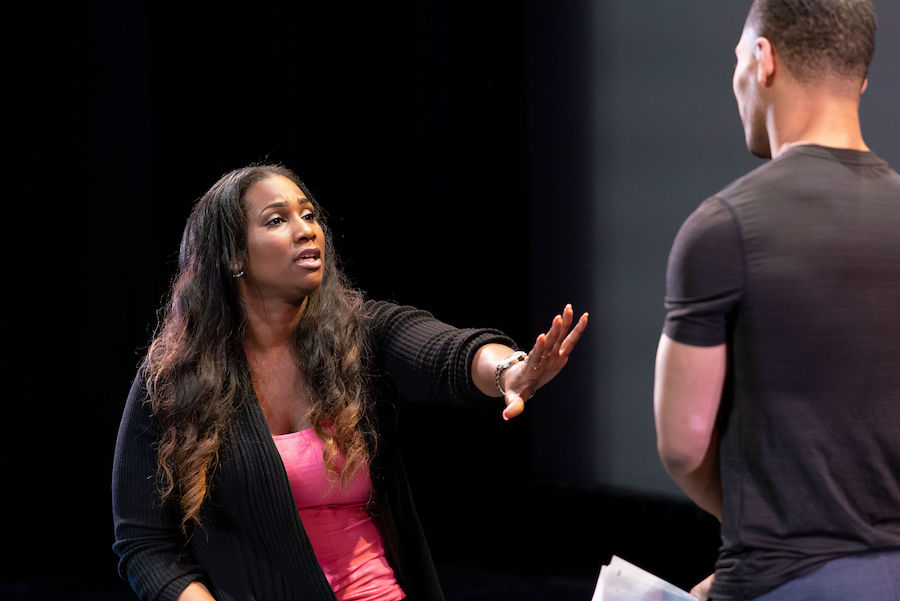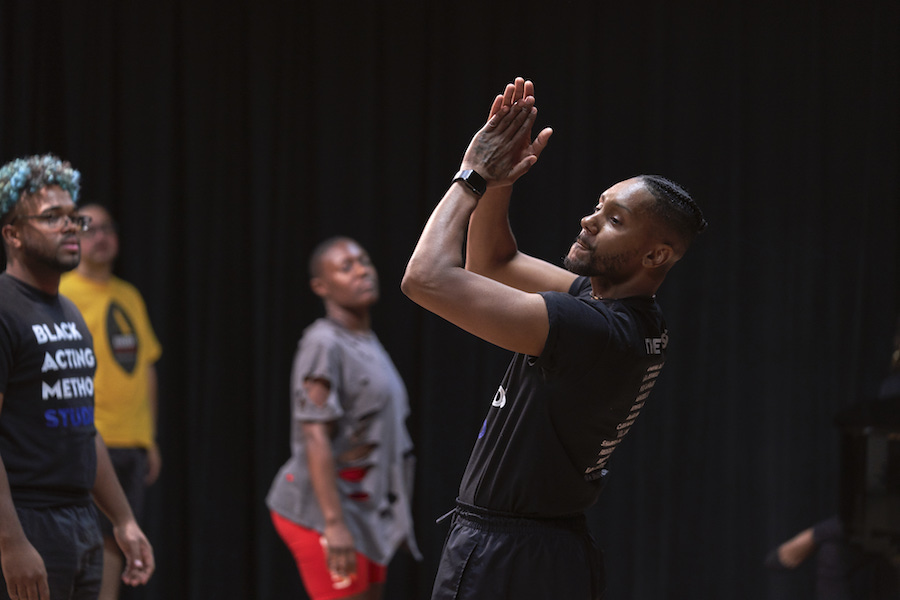The convergence of the pandemic of COVID-19 and the resurgent Black Lives Matter movement has theatre training programs expanding their learning methods this semester—and overhauling their curricula. As COVID caseloads rise and presidential election looms, teachers are tasked with the education and care of students, mostly through a screen.
The 30-page We See You, White American Theatre document released in July pointed to actionable items for theatre pedagogy to meet the moment with an outline of protections for students who are Black, Indigenous, and people of color (BIPOC), including a call for change in the texts and tools used in the classroom. Anti-racism work in theatre—particularly in training—is hardly new, but 2020 has become an inflection point for decentering whiteness and transforming programs to full cultural competency.
To cite on data point: The 2016 book Black Acting Methods: Critical Approaches, by Sharrell D. Luckett and Tia M. Shaffer, was the best-selling theatre text this summer on Amazon, bumping such mainstays as Uta Hagen and Stanislavski from the top slots. While many schools recognize that this moment calls for studying and producing texts by BIPOC theatre artists, Black Acting Methods does more than bench Shakespeare and Chekhov for a season. The book features contributions from directors, scholars, and acting practitioners of color about approaches to performance through an Afrocentric lens.
“Acting theory suffers from what most curricula in the U.S. and even in the world suffers from, which is white supremacy and colonialism,” says Luckett, an assistant theatre professor at the University of Cincinnati. “Most of the ‘greats’ are dead white men.” But not all of the greats, she’s quick to point out. Indeed, Luckett stands on the shoulders of many theatre practitioners of color who have folded mental health and well-being into their approach to performance. Barbara Ann Teer’s “Technology of the Soul” and Freddie Hendricks’s method are a few inspirations. Black Acting Methods: Critical Approaches, though, is the only literary resource that brings this work into the 21st century, Luckett notes.
Luckett was inspired to research and co-write Black Acting Methods because it was research she herself needed to complete her doctorate degree. Moreover, her former high school students wanted more information about the methods she used in the classroom. “There was no book to give them,” she concedes. “I always knew that theatre began in Africa, and so this made me wonder: Where’s all of that knowledge? It’s been hidden, especially in the U.S., because of racism.”
The book led to the opening of the Black Acting Methods Studio in 2017, which offers training in Luckett’s method, coined the Luckett Paradigm. The approach pulls the life experiences of students of color out of the periphery and places it into the center of acting work, and the studio features a licensed in-house clinical psychologist to support that work. This Afrocentric practice can be distilled with the acronym B.L.A.C.K.: building, love, accountability, checking, and knowledge.
“When you come into a room where we’re doing the Luckett Paradigm, you’re going to see building—building conversation, love, self-esteem, self-worth, self-actualization, self-confidence, community, and a constant building of knowledge,” says Luckett.
The emotional palette required of any student actor is taxing, especially for students of color. The Luckett Paradigm lays the groundwork for digging into feelings before parsing through texts and building characters. “Helping the Black actor find their voice is one of the most important things you can do when you’re training Black actor,” explains Luckett. “It’s not about voice work, it’s not about literal physical work, it’s not about character analysis—it is about building the Black actor’s core sense of self. Once you have that foundation, you can do anything.”
This approach isn’t just for Black students, Luckett is quick to point out. The methodology has benefits for all students. In the time of COVID, the Black Acting Methods Studio teachers have been offering online workshops, training sessions, and residencies at university theatre programs. Some upcoming virtual events for the public include a panel about the book with Luckett, David Roman, and Isaih M. Wooden on Oct. 20; a special event with Tarell Alvin McCraney and Jonathan Mathias Lassiter, Ph.D., on Oct. 21; and a session on acting and directing featuring a conversation with Phylicia Rashad, Alana Arenas, and Tina Landau.
“People can take these online courses so they can start feeling really confident about teaching Black Acting Methods in class, about teaching culturally diverse students, training with us continually, and developing that muscle to do that kind of work,” says Luckett. “We all have to develop that muscle. People of color and Black people—we’ve had that muscle our entire lives, you know?”

The current groundswell of anti-racism work at theatre institutions and educational programs is reassuring, though some practitioners who’ve long been working to decolonize theatre pedagogy are leery of a field-wide game of catch-up.
“When people say, ‘Oh well things are changing, or “There’s movement happening’—well, great, but we’re 100 years late,” says Kaja Dunn, assistant professor at the University of North Carolina at Charlotte’s Department of Theatre. “The one thing I’m weary of in the world of theatre and in academia is there’s a rush to commodify what marginalized people have cultivated, which are these really holistic practices.”
Dunn, who recently co-penned a research article on training students of color with Luckett, encourages prospective students to vet schools beyond the statements of equity, diversity, and inclusion featured on website and brochures. “It’s easy to say that you are in solidarity with a community, but solidarity requires sacrifice,” she points out. (And current students at programs across the country have been quick to flag institutions that only paying lip service in the wake of the death of George Floyd and other Black people at the hands of police.)
Dunn recommends that parents and students look beyond the curricula and examine the list of faculty, directors, and casts of school shows. She tells her students considering graduate programs to look the school representatives in the eye at interviews and ask how the school uses a culturally competent curriculum and practice in their training program—a surefire way to suss out institutions. “If they stutter or double blink, you move on,” she advises. Furthermore, she encourages prospective students to reach out to BIPOC alum to ask about their experiences.
Most importantly, the work of dismantling racism in educational settings must be a priority from the top, and not be put onto BIPOC students to carry out, she says. “We cannot continue to let generations of Black artists, Latinx artists, Asian American artists, and other BIPOC artists become fodder and experimentation while white faculty try to figure it out,” she insists, noting that BIPOC faculty often take on the added role of side mentoring BIPOC students.
In her own work, Dunn offers students what was missing from her own theatre training: a BIPOC and female lens on the work. Her syllabi includes two important points: teaching students how to say no to things that make them uncomfortable, and teaching students to recognize autonomy and stand up for themselves in a casting room. These pillars of Dunn’s work as a teacher fold into her work with the Theatrical Intimacy Education Institute, a consulting group that educates best practices for staging intimacy. Consent is particularly important for BIPOC students working with white directors.
Dunn and Luckett are part of a field-wide network of BIPOC educators working together across the country to better support their respective students. “We’re not reinventing the wheel,” says Dunn. “There’s a lot of HBCUs [historically Black colleges and universities] that have done the fundamental work.” Other educational institutions and theatre organizations pushing the needle forward include the CRAFT Institute, the American Alliance for Theatre & Education’s Leaders of Color Institute, Black Arts Institute, Conscientious Theatre Training, and Second Generation Productions, among many others.
Dunn is hopeful that this current moment will move theatre pedagogy in the right direction. “I’m devastated for my community because of the coronavirus pandemic, but I’m also really excited for the innovation and the change that it’s opening up,” says Dunn. “A lot of Black theatres were first on the ground, and a lot of marginalized groups within the BIPOC community were first on the ground to innovate because we’re used to having to work around structures that weren’t built for us. So it’s been heartening to watch that, and then to talk about it with different organizations about what that means.”


